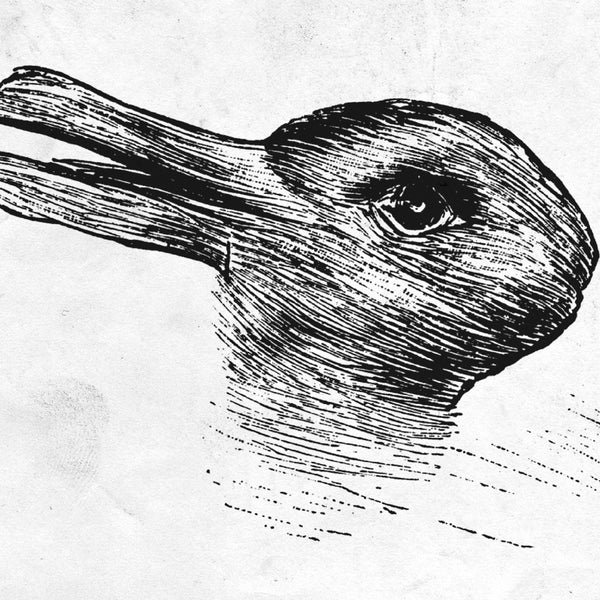Have you ever found yourself “stuck” in an argument with someone? You just cannot seem to convince them of your point of view? And you are completely convinced that you are correct.
This happens all the time in our work with couples. As a matter of fact, it’s one of the most common things couples struggle with.
One of the things that helps us when we are trying to work through a conflict is to take the other person’s perspective. However, that is easier said than done. Shifting your perspective away from the way you typically see something requires cognitive flexibility.
Cognitive Flexibility – what is this?
And what does it have to do with this picture?

When you look at this picture, what do you see? Two faces, looking at each other? Or a goblet?
…Can you see both?
Try to switch your perspective back and forth between seeing a goblet and seeing two people.
Now let’s try this one:

Do you see a bunny looking to the right? … Or a duck looking to the left?
Can you see them both? Try switching back and forth between the two.
The act of switching back and forth between seeing these two images requires cognitive flexibility.
Cognitive flexibility is a skill that can help keep you from spiraling in conflict in your relationships. During arguments, when you could dig your heels in and argue your point harder and more persistently…
I recommend that you try to use your cognitive flexibility.
What would happen if you looked at this from the other person’s perspective? How might this look from their side?
Here’s what we see-
Sometimes couples fight over small and mundane things such as the “right” way to load a dishwasher or perhaps you and your partner find yourself arguing over the proper way to fold the towels. Regardless of the disagreement, we often find ourselves going to bat with our partner over seemingly small things. What if you took a step back and saw that the dishes would still be clean no matter how they were loaded? What if you believed your partner that the towels will fit in the bathroom cabinet, yes, even if they weren’t folded the way that you like?
It’s difficult in the moment. I get it. It is hard to see that any way other than your way could be right, but what if there is no wrong way… just a different way.
Okay, you get the point, you can look past the whole dishwasher issue. By now you may be asking what cognitive flexibility looks like in the BIG arguments? The make it or break it moments. The one’s where you feel deeply passionate about what you stand for. For some it may be helping out a family member financially. For others it may be choosing if you should take that big job opportunity on the other side of the country. It’s in these moments where you can choose to dig your heels in and get ready for battle or you can choose to lovingly take a pause and lean into understanding.
Take a breath. A deep breath. The kind where you inhale for 5 and exhale for 5.
Ask yourself what it would be like to be in your partner’s shoes. Can you imagine what it may feel like to get your own dream job on the other side of the country? The emotions that may arise: excitement over hard work paying off, guilt over uprooting the family, relief over a pay raise after a particularly stressful year.
If you are still having trouble seeing the other person’s point of view, this is where it would be helpful to ask open and genuine questions. For example: Why does this feel important to you? This will give you clarity and help your partner feel understood. Now we are in a productive place for compromise or at the very least understanding.
So the next time you find yourself “stuck” in a disagreement with your partner, I encourage you to utilize your newfound tool of cognitive flexibility. You got this. Stay curious and stay open. I am wondering just how freeing it will feel to be able to move forward together instead of alone with your conviction.
Think you might need some extra help to see things from your partner’s point of view? We can help.
